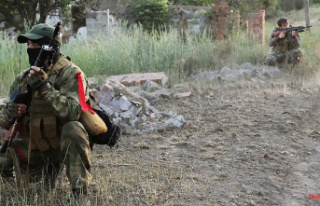It is one of the finance minister's main concerns: in 2023 the government wants to comply with the debt brake again. Christian Lindner describes his budget as crisis-proof, but concedes that the state cannot compensate for all the negative consequences of a lack of gas deliveries from Russia.
The federal government wants to comply with the debt brake for the budget again in 2023. After three years of the state of emergency, the draft budget approved by the cabinet today is within the debt brake, said Finance Minister Christian Lindner. "How was this result achieved? Through consolidation," the FDP politician claimed. Around 50 billion euros less would be spent than planned this year.
New borrowing relevant to the debt brake of only 9.9 billion euros is planned - after almost 140 billion this year. Exactly these 9.9 billion are "the number that the Basic Law allows," said Lindner when the draft was presented. Further fresh loans are not to be counted towards the debt brake because there is a “consideration in the books” for each of these. It is about payments to the statutory health insurance and to the International Monetary Fund (IMF) totaling 7.3 billion euros.
At the same time, Lindner described the draft budget as crisis-proof. "We are ready to react," said the minister. Floating liquid gas terminals would continue to be financed, and one billion euros from the subsidy program set up this year was earmarked to cushion high energy prices for the economy. In addition, there is a crisis provision of 5 billion euros and a global provision of 9.1 billion euros for reduced income and economic fluctuations.
"This budget also reflects the Ukraine war and the ongoing corona pandemic," said Lindner. However, he added: The draft budget "does not contain any scope for a third relief package". The state will also not be able to absorb all the negative consequences for citizens and companies if there are no gas deliveries from Russia. He will not incur more debt than is really necessary. "Debts also drive inflation," said Lindner. However, he does not want to fuel the already high inflation with excessive government spending.
The Union faction in the Bundestag criticized Lindner's draft budget with sharp words. "The household is purely a fair-weather household and will collapse at the first gust of wind," explained budget spokesman Christian Haase. "It doesn't stand up to an honest reality check. The numbers aren't worth the paper they're written on." Haase spoke of a "castle in the air".
How much Lindner is "water up to his neck" is shown by the planned withdrawal from the reserve of 40.5 billion euros originally set aside for refugee costs, Haase explained - previously only 28 billion had been planned. According to the current draft, the reserve would shrink to 7.7 billion euros.
"At the same time, the Federal Minister of Finance is cheating and indirectly circumventing the debt rule," Haase continued to complain. In addition, too little provision is made for the uncertain consequences of the Ukraine war and the unclear further course of the pandemic. "One wonders whether the Federal Minister of Finance is a refusal to accept reality or an optimist," said Haase.












